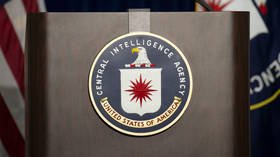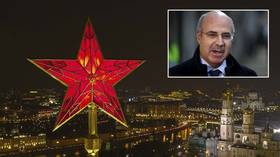Could the CIA be behind the leak of the Pandora Papers, given their curious lack of focus on US nationals?

Hailed as shedding new light on the global elite’s complex financial arrangements, the Pandora Papers pose many questions – not least where are the Americans? Are the authors unwilling to bite the hidden hand that fed them?
On October 3, the Washington, DC-based International Consortium of Investigative Journalists (ICIJ) announced the leak of almost three terabytes of incriminating data on the use of offshore financial arrangements by celebrities, fraudsters, drug dealers, royal family members, and religious leaders the world over.
The ICIJ led what it called “the world’s largest-ever journalistic collaboration,” involving over 600 journalists from 150 media outlets in 117 countries, to comb through the trove of 12 million documents, dubbed the ‘Pandora Papers’.
Among other things, the data reveals the use of tax and financial secrecy havens “to purchase real estate, yachts, jets and life insurance; their use to make investments and to move money between bank accounts; estate planning and other inheritance issues; and the avoidance of taxes through complex financial schemes.” Some documents are also said to be tied to “financial crimes, including money laundering.”
While the publication of articles related to the documents’ bombshell contents is only in its early stages, the Consortium promises that the records contain “an unprecedented amount of information on so-called beneficial owners of entities registered in the British Virgin Islands, Seychelles, Hong Kong, Belize, Panama, South Dakota and other secrecy jurisdictions,” with over 330 politicians and 130 Forbes billionaires named.
Despite the voluminous haul, many critics have pointed out that ICIJ maps of where these “elites and crooks” hail from and/or reside are heavily weighted towards Russia and Latin America – for example, not a single corrupt politician named is based in the US. The organization itself notes that the most significantly represented nations in the files are Argentina, Brazil, China, Russia and the UK – which seems odd, when one considers the Consortium identified over $1 billion held in US-based trusts, key instruments for tax avoidance, evasion, and money laundering.
Then again, past blockbuster releases by the ICIJ, and the Organized Crime and Corruption Reporting Project (OCCRP), its chief collaborator, have contained similarly incongruous omissions. For instance, in March 2019, the latter exposed the ‘Troika Laundromat’, through which Russian politicians, oligarchs, and criminals allegedly funnelled billions of dollars.
The OCCRP published numerous reports on the connivance, and detailed information on the many millions laundered via major Western financial institutions in the process, including Deutsche Bank and JPMorgan Chase. However, not once was HSBC ever mentioned – despite the Troika having openly advertised the bank as its “agent partner,” and then-OCCRP data team head Friedrich Lindenberg publicly conceding that HSBC was “incredibly prominent” in “all” of the Troika’s corrupt schemes.
The reason for this extraordinary oversight has never been adequately explained, although one possible answer could be that the OCCRP’s reporting partners on the story were the BBC and The Guardian. The former was headed by Rona Fairhead from 2014 to 2017, who also served as non-executive director of HSBC between 2004 and 2016. Meanwhile, the latter has long enjoyed a lucrative commercial relationship with the bank, which is surely vital to keeping the struggling publication’s lights on.
The April 2016 Panama Papers investigation, jointly led by the ICIJ and OCCRP, revealed how the services of Panamanian offshore law firm Mossack Fonseca had been exploited by wealthy individuals and public officials for fraud, tax evasion, and to circumvent international sanctions. The pair’s reporting, and resultant media coverage, focused heavily on high-profile individuals such as then-UK prime minister David Cameron, who profited from a Panama-based trust established by his father.
A key promoter of the Papers’ most lurid contents was billionaire Bill Browder. What the convicted fraudster, and indeed a vast number of news outlets that featured his comments about the leak, have consistently failed to acknowledge was that he himself is named in Mossack Fonseca’s papers, linked to a large number of shell companies in Cyprus used to insulate his clients from tax on vast profits he amassed for them while investing in Russia during the tumultuous 1990s, and disguise ownership of lavish properties he owns abroad.
As Browder has testified, he enjoys an intimate relationship with the OCCRP, having engaged them in his global crusade against Russia since his unceremonious ban from entering the country in 2005. Furthermore, many other mainstream outlets, including Bloomberg and the Financial Times, which he has likewise used as pawns in his Russophobic propaganda blitz, have reportedly declined to publish stories about his dubious financial dealings.
Such evident reluctance to bite the hand that feeds could well explain why the Pandora Papers appear largely silent on the offshore dealings of wealthy US nationals and US-based individuals.
Take for instance the fortunes of eBay founder Pierre Omidyar and investor George Soros, which reportedly total at least $11.6 billion and $7.5 billion respectively – no information implicating them in any questionable scheme has yet been unearthed. It may not be a coincidence that both provide funding to the ICIJ and OCCRP via their highly controversial Luminate and Open Society ‘philanthropic’ enterprises.
The OCCRP’s roll call of financiers offers other reasons for concern – nestled among them are the National Endowment for Democracy and United States Agency for International Development, both of which avowedly serve to further US national security interests, and have been embroiled in numerous military and intelligence operations to destabilize and displace foreign “enemy” governments since their very inception. Moreover, though, there are disturbing indications that the OCCRP itself was created by Washington for this very purpose.
In June, a White House press conference was convened on the subject of “the fight against corruption.” Over the course of proceedings, a nameless “senior administration official” announced that the US government would place “the anti-corruption plight at the center of its foreign policy,” and wished to “prioritize this work across the board.”
They went on to state the precise dimensions of this anti-corruption push “[remained] to be seen,” but it was expected that “components of the intelligence community,” including the director of National Intelligence and the Central Intelligence Agency, would be key players therein.
Their activities would supplement existing, ongoing US efforts to “identify corruption where it’s happening and take appropriate policy responses,” by “[bolstering] other actors” such as “investigative journalists and investigative NGOs” already receiving support from Washington.
“We’ll be looking at what more we can do on that front… There are lines of assistance that have jump-started [investigative] journalism organizations,” they stated. “What comes to my mind most immediately is OCCRP, as well as foreign assistance that goes to NGOs.”
These illuminating words, completely ignored at the time by Western news outlets, have gained an even eerier resonance in light of recent developments. Indeed, they seem to establish a blueprint for precisely what has transpired, courtesy of the OCCRP, the very organization it “jump-started” and financially supports to this day.
For its part, the media merely state that the ICIJ “obtained” the documents, their ultimate source unspecified. As such, it’s only reasonable to ask – is the CIA behind the release of the Pandora Papers?
If you like this story, share it with a friend!
The statements, views and opinions expressed in this column are solely those of the author and do not necessarily represent those of RT.













